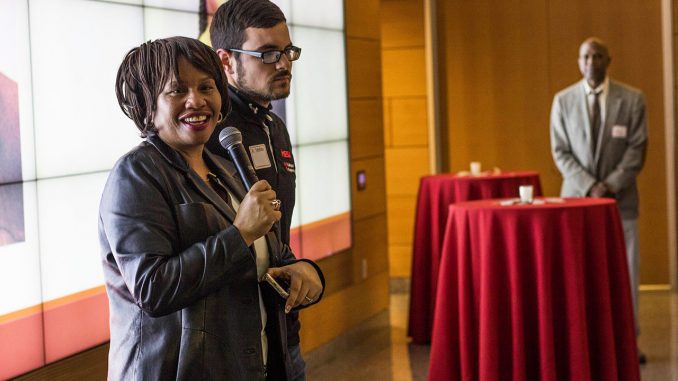
After spending seven years developing STEM outreach programs, Jamie Bracey said she realized Temple needed to address the “elephant in the room” — many Philadelphia students were unprepared for college-level math and science.
“I was seeing a lot of average Joe kids, B, C students, who were not being recruited or not being challenged because they didn’t know [STEM] careers existed,” said Bracey, the College of Engineering’s director of STEM education, outreach and research. “When the kids were given the opportunity to compete, they were standing and delivering.”
She realized that efforts to involve students in STEM had to start in secondary education.
Since 2011, Bracey has fostered middle and high school students’ interest in STEM through after-school programs, like Pennsylvania Mathematics Engineering Science Achievement, a branch of the 10-state MESA USA network, which is housed at Temple.
On Thursday in the Science Education Research Center, Bracey announced an expansion of that work through the launch of the Center for Inclusive Competitiveness, a collaborative STEM outreach program aimed at prioritizing the needs of underserved communities.
“[We] hope that every urban center that we are all active in can press restart, but beyond that, can also compete using STEM in really creative ways to sustain themselves,” Bracey said.
The CIC will conduct programs on local, national and international levels. Within the School District of Philadelphia, the center will begin by partnering with Walter B. Saul High School, Abraham Lincoln High School and Carver Engineering and Science high school to construct and maintain aquaponics labs, which are agricultural systems that raise fish and grow plants together to reduce waste.
The construction of the labs, at Lincoln as well as at George Sharswood School in South Philadelphia and Kenderton Elementary School near the Health Sciences Campus, will begin this week.
The CIC is also looking to partner with Philly Urban Creators, an urban farm on 11th Street near Dauphin, to create an aquaponics system inside a shipping container at the farm.
Bert Johnson, an environmental science teacher at Walter B. Saul and a former organic farmer, will lead all three aquaponics projects. He said interacting with the systems will provide career and technical education students with hands-on experience in environmental science.

Beyond the obvious environmental connections, Johnson added that aquaponics also requires the efforts of many other disciplines, like implementing computer programming and engineering to create an app that receives sensor data about the system’s chemical balance.
“These kids can do more with their cell phones than I’ve ever thought about,” Johnson said. “So if I can open up their eyes and kind of say, ‘Hey, you can do this, hey, you can do that,’ they can take that technology and move on it.”
“It’s not just, ‘Can we get CTE students to understand how to create a smart farm?’” Bracey added. “But what is the business side of agriculture? What’s the marketing that’s associated with that? What’s the computer science associated with that?”
To support the growth of employment in communities of color on a greater scale, the center will also collaborate with ScaleUp Partners — a consultancy and education organization that supports the growth of equitable economies — to develop a national “inclusivity index.”
The index will compile statistics on categories like education and employment to illustrate how certain urban populations, especially communities of color, are underserved.
Bracey said civic institutions can then use the index to improve employment opportunities in these communities, focusing on particular cities’ prominent industries, like energy in Philadelphia.
Several colleges, including Michigan State University, Clark Atlanta University and North Carolina A&T State University, have already asked to partner with CIC and use the index. For these universities, Bracey said access to the index can affect their development of outreach programs so they target prospective students of color and better prepare them for college.
“Many [students of color] have been underprepared, and this is the reality,” Bracey said. “Math is still a problem, and science achievement is still a problem. So if there’s a way for us to help [engage] students in co-ops, engage them in internships to make the sustainability pathway clear to them so they stay focused on their studies, that’s our goal.”
At the CIC launch event last Thursday, Pennsylvania Mathematics Engineering Science Achievement program alumni gathered on the second floor of the SERC to be recognized and speak about their experiences.
Tariq Hook, the chief learning officer at Zip Code Wilmington — a Delaware-based coding school — and MESA’s former head computer science instructor, spoke to the audience about Bracey’s impact on increased diversity in the regional tech community.
“Representation is extremely important, and the thing is, the fact that you see many young brown faces interested in STEM is just phenomenal,” Hook said at the event. “But the reason why you’re seeing all these faces is because one woman had a dream.”
As an African-American mother, Bracey said she can understand personally why this work is so important.
“I realize that if we don’t increase the competitiveness of these kids, if you don’t get their minds right about it, they’re never going to be prepared here in Philadelphia,” she said. “That’s just my mission.”


Be the first to comment